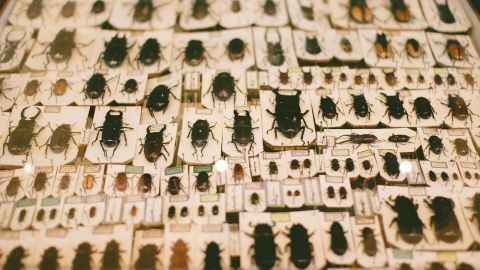Taxonomy - the neglected science of discovery
22 April 2019
Opinion: Taxonomy is crucial to future conservation, biosecurity and innovation, but is in danger of demise through neglect and underfunding argues Tom Saunders.

Our planet is dominated by insects, but as with most life on Earth, we know virtually nothing about them.
We do know they are involved in ecological communities that put food on our tables, remove dung and corpses from the environment, and provide innumerable other ecosystem services we rely on to survive. But with many species of plants, animals, and microbes still unknown, it’s impossible to know what state these services are in.
So why are we standing by as taxonomy, the science of finding, naming and classifying those organisms not yet known, is gutted and left to wither?
Taxonomy is the science of species discovery. It’s an ambitious discipline which aims to catalogue all species on earth and explain the relationships between them. As the origin of species' names and classifications, it’s also a foundation for all biology.
A report published by the Royal Society of New Zealand in 2015 found “inadequate and overall declining support” for natural history collections, and “loss of national capability in specialised expertise in taxonomy,” primarily due to “erosion of investment” and “redundancies, reduced hours, and non-replacement of retiring staff.”
The issues are well-known, but the message still isn’t getting through.
The latest round of restructuring at our national museum makes this very clear. Only sustained pressure by the scientific community in New Zealand, and threats of boycotts from scientists overseas, have forced Te Papa to backtrack over the planned redundancies.
How do we ensure there will be a ‘next generation’ of taxonomists ready to confront the biodiversity crises of the future?
Andrew Stewart was collection manager of fish, and co-author of the 2000-page Fishes of New Zealand which provides text and photographs for every fish species known from our waters. Andrew appealed his redundancy and has now been offered an assistant curator role in what is surely shabby treatment for a scientist who has given almost four decades of his career to Te Papa.
On the other hand, the fate of Dr Bruce Marshall, a mollusc expert who has described over 450 species and published over 120 scientific journal articles, remains unclear.
It’s no wonder taxonomists are an endangered species when they’re treated like this. And in a way, the above episode highlights some of the issues that I believe are symptomatic of broader problems.
First, taxonomy has a communication issue. How many people understand what taxonomy is and how it underpins most other biological science? To a large extent the public is unaware, and it’s not their fault. But worse is when hiring managers, executive officers, and bureaucrats at museums, universities, crown research institutes, government departments, or even the minister of arts, culture and heritage, are unaware. These are the people with the power to support taxonomy and ensure it keeps its head above water. Do they read the reports from the Royal Society, the UN, or the UK House of Lords into the state of taxonomy? Should it really be the burden of those working or volunteering in the taxonomy space to communicate more with decision-makers?
Second, taxonomists are overburdened and underappreciated. It takes 10 to 15 years to develop in-depth taxonomic expertise. So when jobs are cut we lose general discipline knowledge, institutional knowledge and relationships forged, and specialist subject knowledge, all of which takes a long time to acquire.
Around 70 percent of New Zealand’s arthropods are undescribed, and most of New Zealand’s biodiversity is found nowhere else in the world. We can’t just ship in outside experts and expect them to hit the ground running. We need to invest in our own people. Our natural history collections contain thousands of specimens ready to be used in descriptive work, but less than 20 percent of taxonomists here are funded to spend at least half their time on research. How do we explain to decision makers that we already have valuable expertise inside New Zealand, but we just need to recognise it and support it?
Third, education and training opportunities for graduates to enter the field are diminishing. Universities are a primary pathway for new recruits, but specialised taxonomy courses are a thing of the past. Tertiary institutes respond to market forces and student demand when deciding which courses to offer, rather than the broader needs of science and society. Few scholarships focus on taxonomy, and species discovery rarely features as a priority area in the grants that early career researchers compete for. Working taxonomists skew towards the older age brackets, and many feel disheartened by the lack of training for new workers to take their places when they retire. How do we ensure there will be a ‘next generation’ of taxonomists ready to confront the biodiversity crises of the future?
Taxonomy is just too important to neglect.
If we care about our domestic and international conservation responsibilities, then we must identify what species we have, where they are distributed, and what differentiates them from other species;
If we want to protect our economy then we should want top-notch biosecurity expertise to identify incoming pests and diseases that threaten primary production;
If we expect New Zealand to be at the forefront of innovation into new food, fuel, fibre, and medicine, then we should expect a thorough assessment of our unknown species, some of which may harbour the next ‘wonder drug’ or miracle material.
Taxonomists are uniquely trained and equipped to contribute to these areas and more. We just need to get out of their way and support them in their mission.
Tom Saunders is a PhD candidate in Biological Sciences at the University of Auckland. This article reflects the opinion of the author and not necessarily the views of the University of Auckland.
Used with permission from Newsroom Taxonomy - the neglected science of discovery published on 22 April 2019.